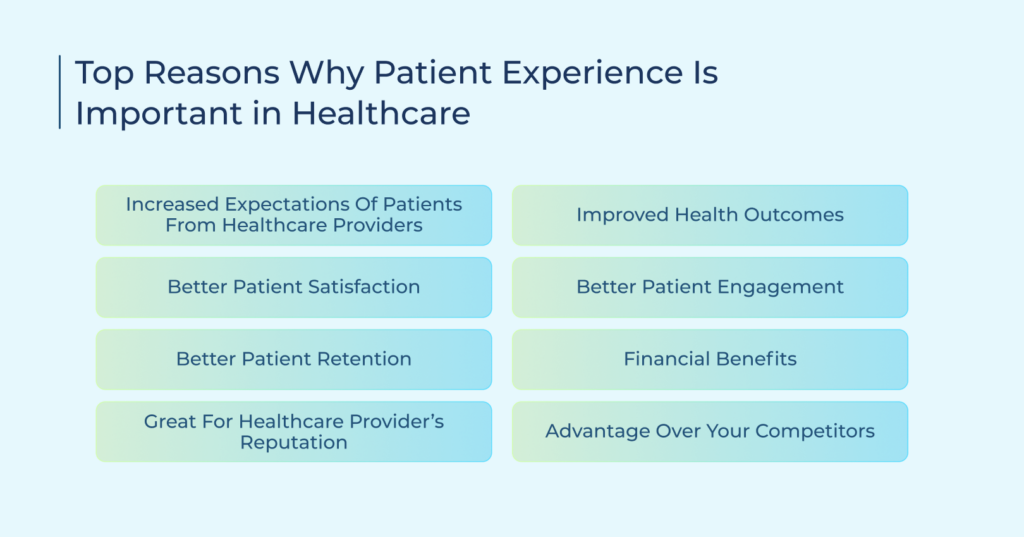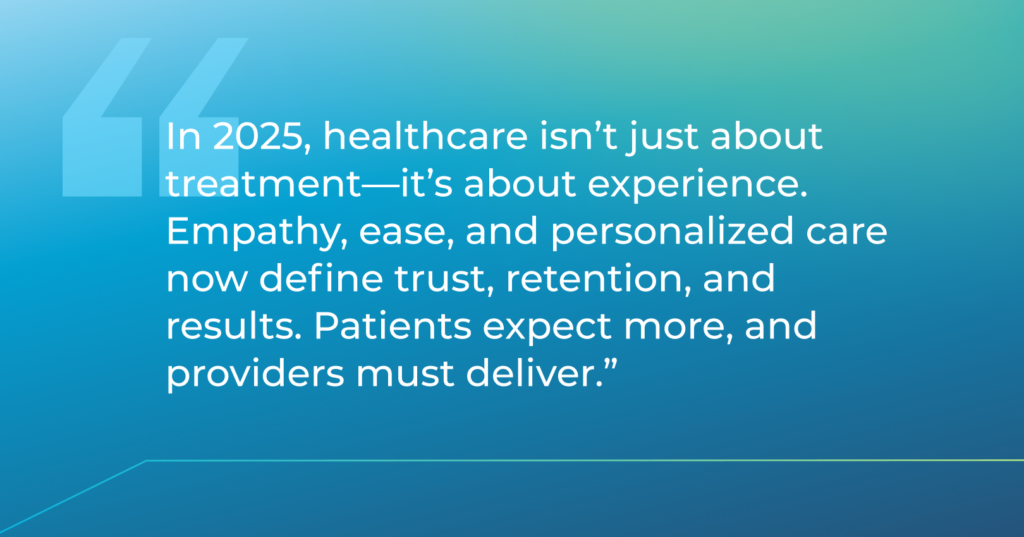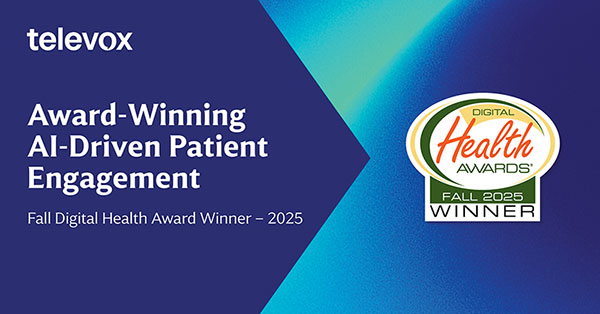Televox is proud to announce that its Enterprise Edition SMS solution has been awarded Gold…

8 Reasons Why You Should Focus on Patient Experience in 2025
Patients have drastically changed their expectations in healthcare. They now demand the same level of convenience, personalization, and quality we receive from a major retail or hospitality brand. Hence, healthcare providers are beginning to rely heavily on technologies like self-service portals, electronic check-ins, automated schedulers, and AI-driven virtual agents to address these growing patient expectations.
Considering how patients readily switch providers, healthcare facilities will always see benefits in retention, outcomes, and financial performance by prioritizing patient experiences. Those that do not face a competitive disadvantage.
Key Elements That Shape a Patient Experience
From the first point of contact to post-care follow-ups, a positive healthcare experience consists of several elements. It is not just about medical treatments. Every interaction, including nurses and staffers, doctors, discharge and billing processes, etc., weighs in on your average patient experience.
Below are some key elements that are commonly involved in defining an exceptional patient experience in health care.
- Empathy and Compassion: Healthcare providers are not just expected to provide medical treatments. They are also expected to be courteous and caring for patients in every interaction and touchpoint of the patient journey. This is how healthcare facilities build a trustable environment.
- Patient-Centered Care: Excluding patients from decision-making is a mistake. Healthcare professionals must engage them about their conditions and hear their considerations. Provide them information on treatment options to help them make the right decision.
- Post-Care Support: The patient journey does not end after exiting a healthcare facility. It is equally important to engage patients afterwards to collect feedback about their experience, push reminders for upcoming appointments, alerts for drug/prescription refills, etc.
- Welcoming Environment: Most patients are undergoing high levels of stress and are in great pain. Having a clean, welcoming environment helps in putting their minds and bodies at ease.
- Efficient Administration and Accessibility: Patients hate to wait, making it important for healthcare facilities to focus on convenience. Simple things like quick customer support and lower waiting times in the waiting areas mean all the difference.
Top Reasons Why Patient Experience Is Important in Healthcare
Healthcare facilities cannot survive for long if they continue to deliver underwhelming patient experiences. The only way patients are going to return for their care is if they felt heard and respected. Here’s why focusing on patient experience matters:

Increased Expectations of Patients from Healthcare Providers
Just like how customers in every industry have growing expectations, patients now expect more from their healthcare providers than just medical treatment. They want clear and professional communication, compassionate care, minimal wait times, excellent doctors, clean settings, etc.
Meeting these expectations builds trust and credibility. Patients who feel their providers understand their needs are more likely to follow treatment plans and recommend your practice to others.
Better Patient Satisfaction
There are two things that bind patients and healthcare providers for improved patient satisfaction levels: trust and communication. That, however, is only possible when healthcare providers actively listen, communicate clearly, and demonstrate empathy. This helps patients feel heard and comfortable that their health concerns are being taken seriously.
Better Patient Retention
Satisfied patients stay with their providers. Prioritizing positive experiences keeps patients for years, creating continuity of care that improves health outcomes.
Returning patients require less administrative work and already trust their providers, making appointments more productive and treatments more effective.
Great for Healthcare Provider’s Reputation
Another reason patient experience is so important in healthcare is its massive impact on a healthcare provider’s reputation. People are only going to recommend a doctor or hospital that provided exceptional care.
Additionally, positive word-of-mouth spreads like fire, as do online reviews and other recommendation mediums to improve the healthcare provider’s credibility and trust within the community.
Improved Health Outcomes
Patients are more likely to follow their treatment plans when they are happy with their healthcare providers. A single negative interaction can create doubt, making patients consider seeking second opinions or alternative medications. This can significantly impact health outcomes and the reputation of the healthcare facility.
Better Patient Engagement
Patients want to be heard and understood. They want to be sure that their healthcare providers are taking their concerns seriously.
By answering patients’ questions with empathy and clear communication and prioritizing personalized care, healthcare professionals can encourage patients to be active participants in their treatments, leading to better health outcomes and stronger patient-provider relationships.
Financial Benefits
Positive patient experiences translate to the provider’s growth. Satisfied patients schedule follow-up appointments, comply with treatment plans, and refer friends and family.
High retention rates reduce the costs of acquiring new patients. Many insurance plans now tie reimbursement rates to patient satisfaction scores, directly connecting experience to revenue.
Advantage Over Your Competitors
Healthcare is a sector where people are never going to risk going to a facility or provider known for negative experiences. While affordability is something that patients most often consider, they are still going to choose a healthcare provider with a solid reputation.
How to Offer the Best Patient Experience in 2025
There are several actionable ways through which practices and organizations can create exceptional patient experiences in healthcare. These methods also help in meeting growing patient expectations while improving health outcomes.
Improve Communication Between Patients and Providers
Clear communication forms the foundation of positive patient experiences. Implement secure messaging systems that allow patients to ask questions between appointments. Explain medical information in plain language without jargon. Schedule brief follow-up calls after complex diagnoses to address concerns. Document patient preferences in their charts to maintain consistency across visits.
Improve Appointment Scheduling
Scheduling an appointment is often the first interaction patients have with healthcare providers. Hence, it is important to set the tone straight away.
Long waiting times or failing to deliver the right information for efficient call handling are just some aspects that should be improved.
Use AI-driven virtual agents to handle daily appointment scheduling and rescheduling. AI tools and systems can also help in identifying bottlenecks.
Additionally, offer patients the option to schedule appointments through self-service online portals. Send appointment reminders to reduce no-shows.
Reduce Wait Times
Most negative patient experiences start from long wait times in waiting areas. Using electronic check-ins is one way to streamline the process as soon as the patient walks in. Additional staff training can help make sure the right staff is available at the right time.
Offer Personalized Patient Care
Patients love personalized healthcare. Having treatment plans tailored to specific needs is also critical for better health outcomes. Documenting communication preferences, health goals, and other patient-specific needs is a good start.
Healthcare providers can also consider creating treatment plans based on patients’ work schedules and family responsibilities. Personalized care plans are guaranteed to improve treatment adherence.
Actively Collect & Act on Patient Feedback
The only way to offer the best patient experience in healthcare is by listening to what they have to say. Have a regular feedback collection loop as part of your post-care support plan. Send out surveys that focus on specific aspects like appointment scheduling, treatment plans, and staff behavior.
But do not forget about acting on the feedback and suggestions. Addressing issues as fast as possible ensures that future patients will have a better and more positive experience.
Patient Experience vs. Patient Satisfaction: Is There a Difference?
Yes, there is a difference between patient experience and patient satisfaction. They are two sides of the same coin that measure the quality of healthcare.
Patient experience is what actually happens during care or your visit. This includes all interactions and events throughout a patient’s healthcare journey. For example, was the waiting room clean and welcoming? Did you have to wait long enough? Was the front-desk staff helpful and courteous? Did the doctor clearly explain how the treatment would go?
Patient satisfaction, on the other hand, is your reaction to the given care. For instance, would you recommend the doctor to your friends? Were you happy with the way you were treated?
The differences are slight, and both terms often end up being used interchangeably. Hence, two patients can receive the same care, but their satisfaction might differ.
| Patient Experience | Patient Satisfaction |
| What happens during care | What you felt about care |
| Based on objective, factual observations | Based on subjective opinions and judgements |
| “Did the doctors introduce themselves?” | “How would you rate your nursing care?” |
| Helps improve and streamline processes | Helps improve reputation and credibility |
| Data can be collected during or immediately after care. | Data can only be collected after care |
Role of TeleVox in Better Patient Experiences
TeleVox brings 30+ years of healthcare experience, managing more than 1 billion patient interactions annually. We understand what it takes to improve communication, engagement and create better patient experiences.
Our SMART Agent technology automatically handles patient communications via phone, text, and online chat without any hold times or voicemail delays. From scheduling appointments to answering common questions, this AI concierge delivers the right information instantly, ensuring patients stay informed and engaged.
SMART Agent integrates directly with EHR systems and your website, pulling real-time data to provide accurate responses. Patients get what they need without navigating complex phone menus, and staff spend less time on routine inquiries. The result? Smoother workflows, reduced frustration, and better patient experiences from start to finish.

Get in touch today to schedule a demo and see first-hand what our automated, digital patient-engagement platform can do for your healthcare facility.



